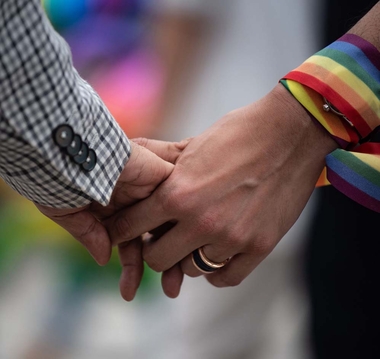Indiana federal appeals court rule: Same-sex parents can both be listed on child's birth certificates

Married same-sex couples in Indiana can list both parents on their children's birth certificates, a federal court ruled Friday.
The 7th US Circuit Court of Appeals issued its ruling Friday, 32 months after it first heard the case. The appeals court upheld a lower court's ruling that by refusing to list both same-sex spouses as parents on birth certificates, Indiana was denying them one of "the constellation of benefits that the States have linked to marriage" under the Supreme Court's same-sex marriage ruling.
"Our clients are delighted," said Karen Celestino-Horseman, one of the lawyers for the same-sex couples. "This takes a lot of weight off their shoulders. They've been living as families and wondering if this was going to tear them apart."
Under Indiana's law, opposite-sex spouses who used artificial insemination could still record a woman's husband as a child's father. However, same-sex couples were banned from doing the same. That meant the nonbiological mother would then have to adopt what, according to Indiana, was her wife's out of wedlock child.
When contacted by CNN, the Indiana attorney general's office said it was unavailable for comment.
A lower court had ruled earlier in favor of the same-sex couples in the case.
However, the parents were still in limbo as to whether the court of appeals would uphold that decision, or whether one wife would have to go through what one lawyer described as the lengthy and expensive process of adopting her non-biological children.
Parents in death, but not in life
The decision brought relief and a sense of closure to plaintiffs Crystal and Noell Allen.
After 16 years of being partners and two of marriage, Crystal became pregnant with twins in 2015 using a sperm donor. Along with their five-year-old daughter, the Allens were excited at welcoming their new twins.
But after complications in the womb, Crystal gave birth to Ashton and Alivea at 19 weeks. They passed away soon after birth.
While grieving the loss of their children, the hospital said they could not list Noell as a parent on their birth certificates. However, she could be listed as a parent on her babies' death certificates.
"When we found out, it was like salt in a fresh wound," Crystal said. "It was OK for us to be associated with their deaths, but not their births. It resonated in a strange way with me about how our government officials felt about us and our families."
The birth certificate for the twins now lists both parents.
The Allens had found it painful to relive their children's deaths in court. They found it difficult to explain their passing to their daughter, Elon, who had been 5 years old at the time. Now 10, Crystal says Elon thought her siblings were rejoicing after the decision.
"I was explaining to her yesterday what the case was about and what it meant, and she said she bets that the twins are doing their happy dance," Crystal said.
Legal uncertainty
The 7th US Circuit Court of Appeals deliberated the case for more than two and a half years -- one of the longest deliberations for that court, according to Celestino-Horseman.
While the case waited in front of the judges, federal courts around the country ruled in favor of same-sex couples in similar birth certificate cases.
In 2017, the Supreme Court confirmed that an Arkansas law requiring husbands to be listed on birth certificates applied to same-sex couples.
While Friday's ruling provided some stability on the issue, Indiana's attorney general could still appeal the case to the Supreme Court. The court's ruling expressly left open the thorny question of a child's legal parentage when it came to same-sex male couples. Because all the plaintiffs were women, the ruling focused on female couples using sperm donors.
When the Supreme Court ruled in 2015 to make same-sex marriage legal across the United States, it opened up a series of legal contests. States must now rule on retirement and social security benefits for couples who were only recently allowed to marry, among other issues.
"It is my hope and prayer that we can move forward with this," Crystal Allen said. "It is my hope that it is over."
By Anna Sturla, CNN via The-CNN-Wire™ & © 2020 Cable News Network, Inc., a WarnerMedia Company. All rights reserved.
The Gayly. 1/19/2020 @ 9:40 p.m.





